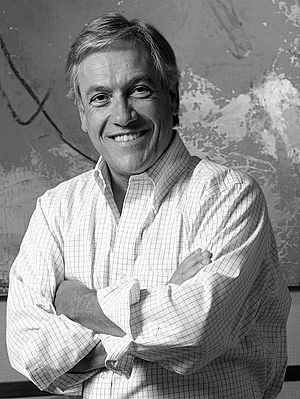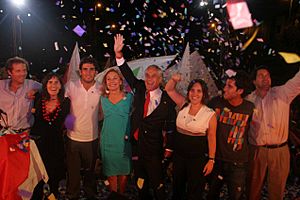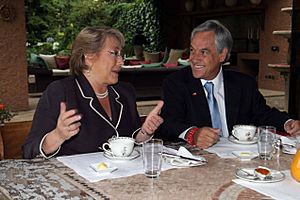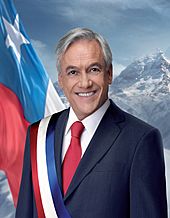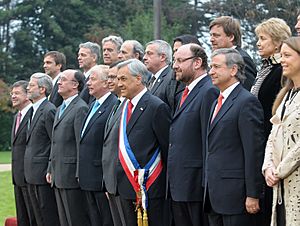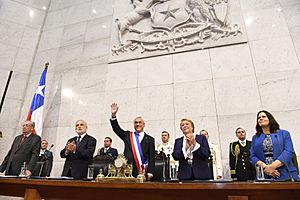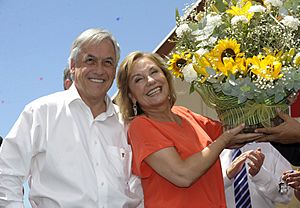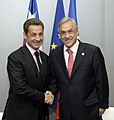Sebastián Piñera facts for kids
Quick facts for kids
Sebastián Piñera
|
|
|---|---|
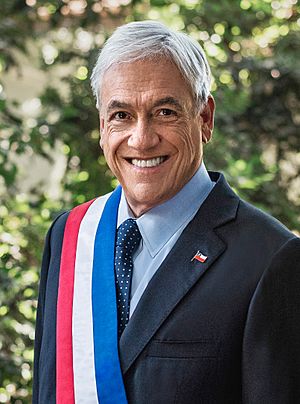
Official portrait, 2018
|
|
| 34th and 36th President of Chile | |
| In office 11 March 2018 – 11 March 2022 |
|
| Preceded by | Michelle Bachelet |
| Succeeded by | Gabriel Boric |
| In office 11 March 2010 – 11 March 2014 |
|
| Preceded by | Michelle Bachelet |
| Succeeded by | Michelle Bachelet |
| President pro tempore of PROSUR | |
| In office 22 March 2019 – 12 December 2020 |
|
| Preceded by | Position established |
| Succeeded by | Iván Duque |
| Leader of National Renewal | |
| In office 26 May 2001 – 10 March 2004 |
|
| Preceded by | Alberto Cardemil |
| Succeeded by | Sergio Díez |
| Senator for Eastern Santiago | |
| In office 11 March 1990 – 11 March 1998 |
|
| Preceded by | Position established |
| Succeeded by | Carlos Bombal |
| Personal details | |
| Born |
Miguel Juan Sebastián Piñera Echenique
1 December 1949 Santiago, Chile |
| Died | 6 February 2024 (aged 74) Ranco Lake, Futrono, Chile |
| Political party | National Renewal (1989–2010) Independent (2010–2024) |
| Other political affiliations |
Coalition for Change (2009–2013) Chile Vamos (2015–2024) |
| Spouse |
Cecilia Morel
(m. 1973) |
| Children | 4 |
| Education | Pontifical Catholic University of Chile (BS) Harvard University (MA, PhD) |
| Signature |  |
Miguel Juan Sebastián Piñera Echenique (born December 1, 1949 – died February 6, 2024) was a Chilean businessman and politician. He served as the president of Chile for two terms: from 2010 to 2014, and again from 2018 to 2022.
Sebastián Piñera was the son of a diplomat and politician. He studied business at the Pontifical Catholic University of Chile and economics at Harvard University. He was known as one of the richest people in Chile.
He was a member of the National Renewal party, which is a liberal-conservative party. He served as a senator for the East Santiago area from 1990 to 1998. He ran for president in 2005 but lost to Michelle Bachelet. He ran again in 2010 and won, becoming Chile's first conservative president to be chosen by the people since 1958. He was also the first conservative president since Augusto Pinochet left office in 1990.
Piñera passed away in a helicopter accident on Ranco Lake on February 6, 2024.
Contents
Early Life and Education
Sebastián Piñera was the sixth child of José Piñera Carvallo and Magdalena Echenique Rozas. His family has a long history in Chile, and his mother's family includes ancestors like Luisa Pinto Garmendia, whose brother and father were also presidents of Chile. He was also the nephew of Bernardino Piñera, a well-known Roman Catholic bishop.
When he was one year old, his family moved to Belgium and then to New York City. His father worked as the Chilean ambassador to the United Nations there. Piñera returned to Chile in 1955 and went to the Colegio del Verbo Divino school, graduating in 1967.
After high school, Piñera attended the Pontifical Catholic University of Chile. He earned a degree in commercial engineering in 1971 and was recognized as the best student in his class. He then went to Harvard University for advanced studies in economics, earning both a Master of Arts and a PhD in Economics after three years.
His Career Journey
Teaching and Helping Foundations
Piñera taught economics at several universities in Chile from 1971 to 1988. These included the University of Chile, the Pontifical Catholic University of Chile, and Adolfo Ibáñez University.
In 1989, Piñera helped create the Enterprising Women Foundation (Fundación Mujer Emprende). This foundation helps young women from lower-income families develop their skills. He also started the Fundación Futuro in 1973, which later became Fundación Cultura y Sociedad. This foundation works to support justice, freedom, and democracy in Chile.
Under Fundación Cultura y Sociedad, there is a group called Grupo Tantauco that focuses on protecting the environment. In 2005, Piñera bought a large private nature reserve called Tantauco Park on Chiloé Island. This park helps protect the unique plants and animals of the region and is open for people to visit and enjoy nature.
Business Ventures
Before becoming president, Piñera was a very successful businessman. He was the general manager of the Banco de Talca. He also owned a large part of Chilevisión, a national television channel. He had shares in LAN Airlines, one of the biggest airlines in South America, and even owned a part of Colo-Colo, a famous football (soccer) club. He also invested in other companies.
In 2007, he was fined for not canceling a stock purchase order after getting some private information about LAN Airlines. After this, he left the boards of LAN and Quintec.
To avoid any conflicts of interest when he became president, he sold Chilevisión for $160 million in 2010 to Time Warner. He also sold his shares in LAN Airlines and his part of the Colo-Colo football club.
Piñera built a large fortune, estimated at around $2.8 billion by 2018. Much of his wealth came from introducing credit cards to Chile in the late 1970s and his smart investments, especially in LAN Airlines stock.
Political Career
In 1988, as Chile was moving back to democracy, Piñera supported the Christian Democrat candidate Eduardo Frei Ruiz-Tagle for president.
In 2005, Piñera announced he would run for president. He described his political beliefs as Christian humanism, which combines Christian values with a focus on human dignity and freedom.
Becoming President
Piñera ran for President of Chile in the 2009–2010 election. He was leading in opinion polls against other candidates. In the first election on December 13, 2009, Piñera received the most votes (44.05%), but not enough to win outright. So, he went to a second round of voting on January 17, 2010, against Eduardo Frei Ruiz-Tagle.
Piñera won the second round with 51.61% of the votes. This victory was a big change for Chile, as it ended two decades of center-left leadership and made him the first elected right-wing leader in 52 years.
After winning, Piñera stopped being a member of his political party, National Renewal. This is a rule for presidents from his party, so they can govern fairly for all people, not just for one party.
Before he officially became president, Piñera promised to sell his shares in major companies to avoid any conflicts of interest. He put about $400 million of his wealth into special "blind trusts" so he wouldn't know how they were being managed.
First Time as President (2010–2014)
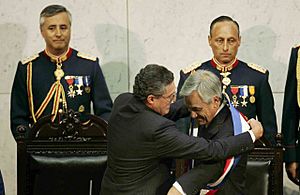
Piñera officially became the 34th President of Chile on March 11, 2010, in a ceremony in Valparaíso. During the ceremony, there was a strong earthquake and aftershocks, which surprised everyone present.
One of the most famous events during his first term was the rescue of 33 trapped miners in October 2010. All the miners were saved after 70 days underground, and Piñera was praised for his leadership during this difficult time.
In 2011, there were large student protests in Chile. Students were asking for changes to the education system, wanting public ownership of schools. Piñera supported private businesses in education and wanted to make it legal for them to make a profit. His public approval dropped during these protests.
As president, Piñera also supported Argentina's claim over the Falkland Islands, saying Argentina had "unrenounceable rights" to them. He also worked to improve relations with other countries, visiting Spain and Vietnam to sign agreements on trade, education, and tourism.
Second Term as President (2018–2022)
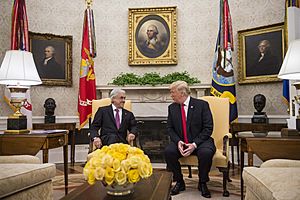
On December 17, 2017, Sebastián Piñera was elected president of Chile for a second time. He won the election with 54% of the votes against Alejandro Guillier. He took office again on March 11, 2018.
During his second term, his government introduced "The Women's Agenda" in response to large feminist protests. In 2021, Piñera also announced his support for a same-sex marriage bill, which was a surprise to some of his conservative supporters.
Conflict with the Mapuche People
Piñera's government faced challenges in the Araucanía Region, where the Mapuche people were asking for their traditional lands back. These lands are now often used by large companies. There were protests and some violent incidents, which led the government to declare a state of emergency and send military forces to the region.
Personal Life
Piñera married Cecilia Morel in 1973. They lived near each other in Santiago. They had four children, all of whom have university degrees. Piñera was also a member of the Inter-American Dialogue, a group that discusses issues in the Americas.
Death
On February 6, 2024, Piñera died in a helicopter accident near Lake Ranco in southern Chile. The helicopter was a Robinson R66. His daughter, granddaughter, and son-in-law survived the accident.
After his death, the government of President Gabriel Boric declared a period of national mourning. Piñera was given a state funeral, which is a special ceremony for important national figures.
Styles, Honours and Arms
| Presidential styles of Sebastián Piñera Echenique |
|
|---|---|
 |
|
| Reference style | His Excellency |
| Spoken style | Your Excellency |
| Alternative style | Mr. President |
National Honours
 Grand-Master (2010-2014 and 2018–2022) and Collar of the Order of Merit
Grand-Master (2010-2014 and 2018–2022) and Collar of the Order of Merit Grand-Master (2010-2014 and 2018–2022) and Collar of the Order of Bernardo O'Higgins
Grand-Master (2010-2014 and 2018–2022) and Collar of the Order of Bernardo O'Higgins
Foreign Honours
 Norway: Grand Cross of the Order of Saint Olav (27 March 2019)
Norway: Grand Cross of the Order of Saint Olav (27 March 2019) Peru: Grand Cross with Diamonds of the Order of the Sun (25 November 2010)
Peru: Grand Cross with Diamonds of the Order of the Sun (25 November 2010) Spain: Collar of the Order of Isabella the Catholic (4 March 2011)
Spain: Collar of the Order of Isabella the Catholic (4 March 2011)
Arms
-
As Knight of the Collar of the Order of Isabella the Catholic
(Attributed)
Images for kids
-
Piñera with Brazilian President Jair Bolsonaro, Santiago, 23 March 2019
-
Piñera with David Cameron, Prime Minister of the United Kingdom, outside 10 Downing Street, London
-
President Piñera meets with French President Nicolas Sarkozy on 18 May 2010
See also
 In Spanish: Sebastián Piñera para niños
In Spanish: Sebastián Piñera para niños
 | Misty Copeland |
 | Raven Wilkinson |
 | Debra Austin |
 | Aesha Ash |


